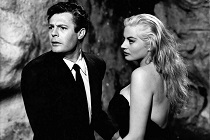
FLM/ITAL 305: Modern Italian Cinema
Course Description
Italian film has been vital to the history of film around the world for decades, as well as being important in its own right. From Neorealism just after WW2 to Fellini in the 1960s to current modern Italian filmmakers, Italian film is unique and exciting. In just the last few years a number of rising stars in Italian film-making are receiving recognition across the industry. In short, Italian filmmakers are fast-becoming some of the world-wide film industry’s most important voices. And the number of filmmakers from Italy today is extensive.
In our brand new five-week class our focus will be on modern films after an initial foray into Italian film history. Over the course of the class we’ll watch, discuss and analyze ten films, relating them to Italian culture and identity and applying film theory and criticism. We will view films produced and set in various regions throughout the country of Italy.
On two trips to the local art-film theater we’ll watch American films in English with Italian subtitles, (or try the Italian films on alternate screens). Our big field trip will be to the movie production studies Cinecittà in Rome to tour the site where many important Italian films were created.
Over the course of these five weeks, you will not only learn about Italian film yesterday and today, but you will learn to write professional, publishable film analyses as you integrate the knowledge of context—the country of Italy and its history and people—into your work.
Learning Outcomes and Assessment Measures
Below are the course’s learning outcomes, followed by the methods that will be used to assess students’ achievement for each learning outcome. By the end of this course, students will be able to:
- identify distinct eras of Italian film history, filmmaking, directors and subject matter;
- identify mise-en-scene, cinematography, editing and sound as distinct and important elements of filmmaking;
- recognize regional subject matter and identity in films from various regions;
- analyze Italian films using film theory and spectator theory;
- produce written film analyses as distinct from film reviews and know how to tell the difference.

